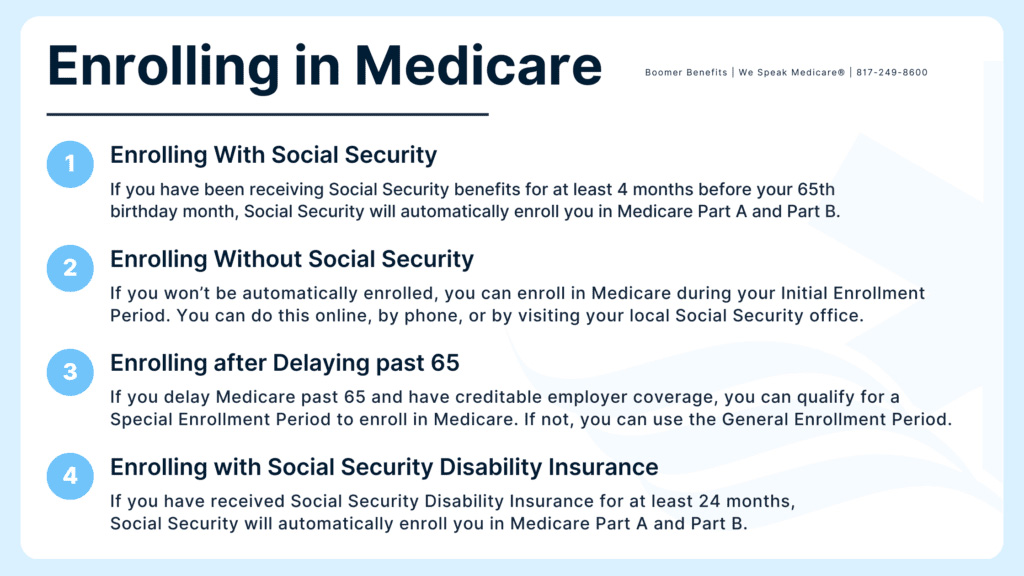KEY POINTS
- When figuring out how to apply for Medicare, beneficiaries should evaluate their Medicare enrollment timeline, so they can take the proper steps to avoid any financial penalties.
- With Medicare eligibility, there are age requirements and exceptions for disabilities or specific medical conditions.
- Familiarize yourself with the different parts of Medicare to fully understand your coverage options and select suitable plans.
Something beneficiaries learn too late is that the federal government does not notify them of when it is time to sign up for Medicare. They expect you to know how to apply for Medicare and when and how to proceed with the process based on your timeline.
Still, the Medicare system and all its parts and rules can be confusing and overwhelming. How old do you have to be to get Medicare? Can you get Medicare before 65? Correctly navigating the enrollment process will help you secure your Medicare health benefits without any financial mishaps or preventable mistakes that lead to permanent consequences.
This step-by-step guide on how to apply for Medicare will cover all you need to know, from eligibility criteria to tips for selecting a suitable plan for your needs.

Who is eligible for Medicare?
Before you start trying to figure out how to enroll in Medicare, you first want to ask when you can sign up for Medicare.
You’d think the questions “How old do you have to be to qualify for Medicare?” or “What is Medicare eligibility age?” would be easy to answer, but the criteria are a bit more complex than you’d expect. Generally, most people become qualified for Medicare when they turn 65.
However, there are exceptions for those with certain disabilities or medical conditions. If you are under 65, receiving Social Security Disability Insurance (SSDI) for at least 24 months, or have been diagnosed with end-stage renal disease (ESRD) or amyotrophic lateral sclerosis (ALS), you can qualify for Medicare before 65.
Understanding the Different Parts of Medicare
Trying to figure out how to apply for Medicare is a key step when starting your Medicare journey, but understanding how Medicare works also needs to be at the forefront of your to-do list.
There are elements to Medicare, each covering different parts of your healthcare services:
Part A
Medicare Part A provides coverage for your inpatient hospital, skilled nursing facility care, hospice care, and certain home health care services.
Part B
Part B covers outpatient medical services, such as doctor visits, preventive services, lab work, and physical therapy.
These are the two parts that come from the federal government.
Part C
Another name for Medicare Part C is Medicare Advantage. These plans are managed through private insurance companies. It includes Parts A and B and often additional benefits like prescription coverage and dental and vision benefits.
Part D
Medicare Part D covers your prescription medications you’d pick up at the pharmacy. You enroll in a Part D plan through a private insurance carrier to help cover the cost of medications.
Understanding these parts and how they cover your healthcare services will make the Medicare process easier when selecting the most suitable coverage for your healthcare needs in retirement. After comprehending the basics, you can begin asking the more directly related questions like “When can I get Medicare?” or “Where do I sign up for Medicare?”.
How to Enroll in Medicare: Step-by-Step Instructions
When starting the process of enrolling in Medicare, the steps can vary depending on your circumstances.
Here’s a general overview of the different routes:
- If you’re already receiving Social Security benefits at least four months before your 65th birthday month, you do not need to worry about how to apply for Medicare at 65 because you will be automatically enrolled in Medicare Parts A and B. Your Medicare card should arrive a few months before your birthday month, and your benefits will become effective on the first of your 65th birthday month (unless your birthday starts on the 1st).
- If you’re not receiving Social Security benefits, you’ll apply for Medicare through the Social Security Administration (SSA) during your Initial Enrollment Period. This enrollment process can be done online, by phone, or by visiting your local SSA office.
- If you become eligible for Medicare but delay your enrollment, you can qualify for a Special Enrollment Period (SEP) or the General Enrollment Period (GEP), depending on your circumstances.
- If you are receiving Social Security Disability Income benefits for at least 24 months, you qualify for Medicare.

Common Mistakes to Avoid When Applying for Medicare
Once you realize the transition to Medicare might be more complicated than expected, the right question to ask yourself is, how do I sign up for Medicare correctly? There are some common missteps you want to avoid as they could lead to coverage gaps or financial penalties:
- If you miss your Initial Enrollment Period (IEP) and do not have creditable employer coverage, you could face permanent late enrollment penalties.
- Although technically voluntary, not enrolling in a Medicare Part D prescription plan when you become eligible could mean a lifetime financial penalty.
- As we previously stated, there are four main parts of Medicare, but there are many Medicare plans as well. Understanding the concept and the differences between Original Medicare, Medicare Advantage, and Medicare Supplement plans will prevent confusion when selecting your coverage.
What to Do If You Missed the Medicare Enrollment Deadline
If you missed your Medicare enrollment deadline, don’t panic. You can still enroll in Medicare during the yearly General Enrollment Period or, if you qualify, a Special Enrollment Period (SEP). One qualifying reason for a SEP could be the loss of employer-sponsored health coverage.
Tips for Choosing the Right Medicare Plan
When it comes down to choosing your Medicare plan, there are multiple factors to consider before a final decision. Consider your health and which benefits are most important to you. Compare costs, such as monthly premiums, deductibles, copayments, and coinsurance. Are you okay with a provider network? Do you want the ability to see a wide range of healthcare providers?
Consider all of these factors when evaluating which route you want to take.
Frequently Asked Questions About Medicare: How do I sign up for Medicare when I turn 65?
Your Initial Enrollment Period (IEP) into Medicare is a seven-month window surrounding your 65th birthday month. It begins three months before your birthday month and ends three months after. However, if your birthday is on the 1st of the month, your IEP begins a month before.
How long before you turn 65 do you apply for Medicare?
If you enroll in Medicare during your Initial Enrollment Period, you can apply as early as three months before your 65th birthday month. When you apply during the months before, your Medicare benefits become active on the first of your birthday month.
How to apply for Medicare online?
Medicare beneficiaries will apply through the Social Security office. If you want to apply online, you begin here: https://www.ssa.gov/medicare/sign-up.
How much does Medicare cost?
The cost of Medicare typically changes annually. Medicare Part A is free for most people. Everyone pays the premium for Part B (unless you qualify for Medicaid). The standard Part B premium in 2024 is $174.70. However, Social Security determines your premium based on your income. If your income is higher, you pay more for your Part B and D premiums.
The costs can vary for specific plans since the rest of your Medicare plan options come from private insurance carriers. Check out our Medicare costs page here to learn more: https://boomerbenefits.com/new-to-medicare/medicare-cost/
How do I sign up for Medicare Part A only?
If you plan to delay Medicare Part B, you can sign up for Part A only on the Social Security website.
Can I sign up for Medicare Part B online?
If you have Part A already but need Part B, select “Part B only” when on the SS website: https://www.ssa.gov/medicare/sign-up/part-b-only.
However, if you are applying for Part B because you qualify for a SEP, you will submit CMS form L564 in addition to your Part B application.
How to get a Medicare card?
Security can take a while to process your application. Therefore, it may be several weeks before you receive your card. You should also be able to check your SSA account to see if your Medicare number is available.
Can I keep my current health insurance if I enroll in Medicare?
Depending on your coverage, it may be considered primary or secondary to Medicare. You would need to contact your current plan directly to understand how it would coordinate with Medicare. If your current coverage is through the ACA, you would need to cancel it once you have Medicare. These two do not coordinate.
What is the Medicare Annual Election Period (AEP), and when does it occur?
The Annual Election Period (October 15 – December 7) allows beneficiaries to make changes to their Medicare Advantage or Part D plans.
Conclusion
Hopefully, you can better understand how to qualify for Medicare and navigate the enrollment process. With the right information and guidance, you can make informed decisions to ensure you have comprehensive and financially sound coverage.
For help with Medicare enrollment, consider reaching out to a Medicare broker like us. As a broker, we can help with your Medicare questions and plan options and provide lifetime customer support! Don’t hesitate to give us a call – We want to help you make this Medicare journey as seamless as possible.
Key Takeaways:
- By researching Medicare eligibility and enrollment processes well in advance, you can avoid late enrollment penalties and potential gaps in coverage.
- Memorize the common enrollment pitfalls beneficiaries make, such as missing your enrollment or misunderstanding plan options to avoid meeting the same fate.
- Consult with a Medicare broker so you can make decisions tailored to your specific needs and financial situation.



